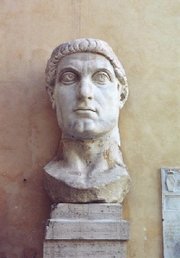Constantine I
| Constantine, Roman Emporer | |
| RELATED TOPICS | |
| SERMONS, ESSAYS AND OPINIONS |
|
| CONTENTS | |
Constantine was a Roman Emperor in the fourth century AD, famous for ending persecution of Christians in the Roman Empire with his Edict of Milan
Biography
The full name of Constantine I was Flavius Valerius Aurelius Constantinus. He is also known as Constantine the Great and Saint Constantine. He was born on February 27 in 272 AD and died on May 22 in 337 AD.
Constantine I is best known for probably being the first Christian Roman Emperor and issuing the the Edict of Milan with his co-emperor Licinius which brought freedom of religion to the Empire. This edict helped to put an end to institutionalized persecution of Christians in the Roman Empire.
Historically Constantine is also extremely significant for his decision in 324 AD to make Byzantium (in modern-day Turkey) into the "New Rome". On May 11 in 330 AD he officially proclaimed the city to be the new capital of the Roman Empire. The city was renamed Constantinople (The City of Constantine) after Constantine's death in and it remained the capital of the Byzantine Empire (Eastern Roman Empire) for over a thousand years until it finally fell to the Muslim Ottoman Empire in 1453 AD.
Assessment of Constantine's view of and impact on Christianity
The accession of Constantine to the throne changed things greatly for Christians within the Roman Empire. With him there was an end to physical persecution, the beginning of finanacial prosperity within the church and a government that wanted to interact and interfere with the affairs of the church.
He was favourable to Christianity and therefore there was no longer physical persecution directed by state. Why Constantine was favourable to Christianity is unclear but it is likely that these factors played a role
- His political pragmatism in seeing Christianity as being a tool for unity in the Empire
- His respect for the Christian God as being powerful and helping in battle
- Possibly a personal conversion to Christainity, although this is debated among scholars
Following his command of religious toleration in the Edict of Milan, ot became clear that Constantine wanted an input into church hierarchy and doctrine. For example, it was under Constantine's instructions that the Council of Nicea was called to address Arianism. His involvement in church affairs can be viewed as the beginning of state involvement and interference with the church. Some positive outcomes of this involvement included restoration of property to the church.
With and following Constantine, Christianity became increasingly accepted in society, which acted as a catalyst for some very devout Christians to react against this "easy" Christianity by withdrawing into wilderness areas. In this way monasticism was born.
Furthermore, following Constantine, questions arose among the chruch regarding what to do with Apostates (those who had renounced their faith under threat of persecution). One group within the church who felt that Apostates should not be readmitted to the church. This group became known as the Donatists and broke away from the church and developed an anti-government stance. Its power-base was in North Africa, and Constantine backed the majority in the church which was anti-Donatist.
This biographical article is a stub. You can help WikiChristian by expanding it
Links
Return to Famous Christians
Note to users: The wiki is currently operating in safe mode. Editing is limited to users with certain privileges in order to deal with spam. You can create a new user account, and confirm your email ID in order to obtain ability to edit pages. Learn how to be an editor or sysop at WikiChristian.
- Sister projects: WikiMD.com Wellness Encyclopedia & Directory
- Sponsors: WikiChristian is supported by W8MD's medical weight loss and sleep centers.

